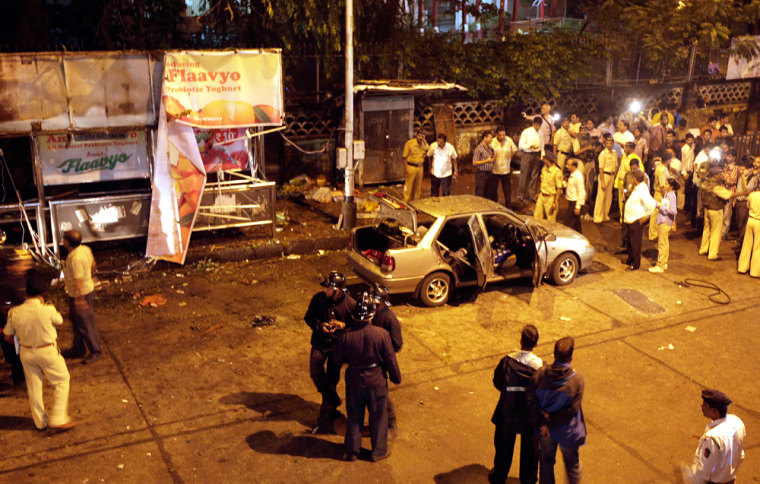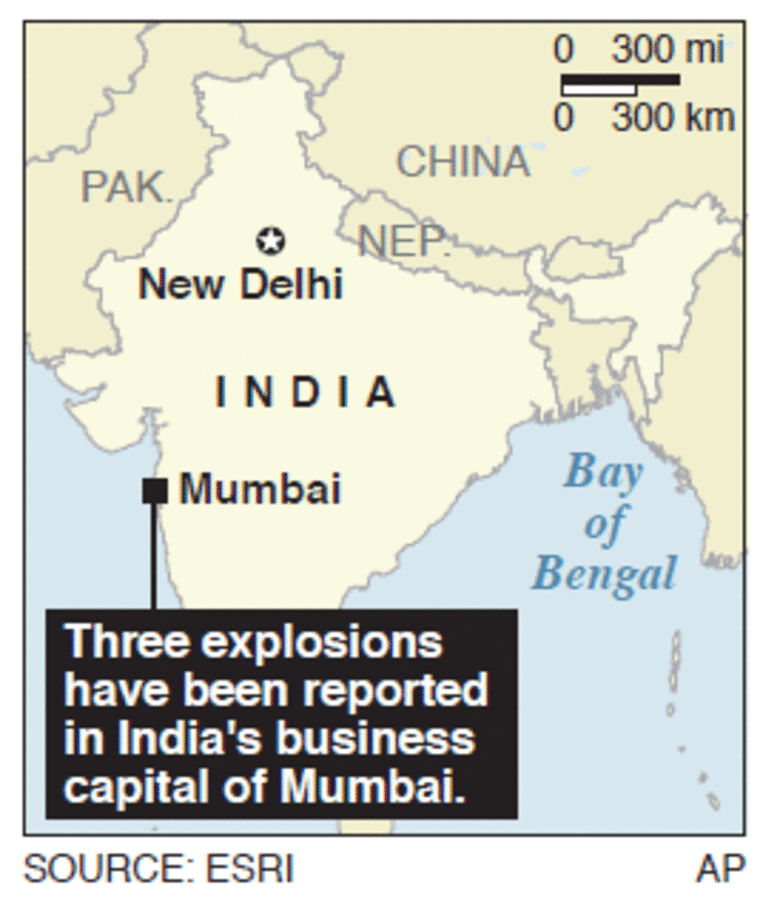Indian police searched for clues on Thursday about who was behind three coordinated bomb blasts that killed at least 17 people in Mumbai, the biggest attack since Pakistani-based militants rampaged through the financial hub in 2008.
Mumbai police blamed Wednesday's attacks on the Indian Mujahideen, a shadowy home-grown Islamist group said to have support from militants in Pakistan, according to source-based media reports that could not be independently confirmed.
The government's official press office lowered the death toll to 17 from an earlier figure of 21 killed, although the number may change again.
Prithviraj Chavan, chief minister of Maharashtra state, told Indian TV station NDTV that the blasts occurred between 6:50 p.m. and 7:04 p.m. local time (9:20 to 9:34 a.m. ET).
Blood-covered bodies lay on Mumbai streets and people hugged and wept. Others carried the wounded to taxis. Crowds gathered in the blast areas as police questioned witnesses, and bomb squads inspected the undercarriages of vehicles searching for clues and other explosives.
Motorcycles were charred, shopfronts shattered and a bus stop ripped apart.
It was the first terrorist attack on the city since 10 militants laid siege to Mumbai for 60 hours in November 2008, killing 166 people and escalating tensions with Pakistan. There was no immediate claim of responsibility.
"I have appealed to the people of Mumbai to maintain peace and calm," Chavan told NDTV. "We will face this calamity and challenge to our sovereignty ... we will fully meet this challenge."
He called the explosions "an attack on the heart of India"
The first blast struck the Jhaveri Bazaar at 6:54 p.m., tearing through the famed jewelry market. A minute later, a second blast hit the busy business district of Opera House, several miles away in southern Mumbai. At 7:05 p.m., the third bomb exploded in the crowded neighborhood of Dadar in central Mumbai, according to police.
The Zaveri Bazaar blast took place in an umbrella kept at the crowded Kahu Gali, a street of eateries where many commuters stop to snack before catching their local trains home, NDTV reported. The Dadar West explosion took place in a meter box on an electric pole near a bus stop, it said. The Opera House blast, the most powerful of the three, took place at Prasad Chamber building.
At least one car and a motorbike were used in the coordinated attacks in which improvised explosive devices were believed to have been used, officials said.
A bomb that failed to go off was found in Dadar, NDTV reported, and a bomb disposal squad was working to defuse it.
Because of the close timing of the bomb blasts, "we infer that this was a coordinated attack by terrorists," Home Minister Palaniappan Chidambaram said, adding that Mumbai was put on high alert.
Prime Minister Manmohan Singh condemned the blasts and also appealed to the people of Mumbai "to remain calm and show a united face."
In Washington, President Barack Obama also condemned the "outrageous attacks"
"The American people will stand with the Indian people in times of trial, and we will offer support to India's efforts to bring the perpetrators of these terrible crimes to justice," he said in a statement. "I have no doubt that the India will overcome these deplorable terrorist attacks."
The U.S. State Department said it would offer India assistance in its response and investigation of the Wednesday attack, just as it did in 2008.
The State Department said the blast would not change Secretary Hillary Clinton's already scheduled visit to New Delhi July 18-20, NBC News reported.
"I believe it is more important than ever that we stand with India, deepen our partnership and reaffirm our commitment to the shared struggle against terrorism," Clinton said in a news conference with the Russian foreign minister.
The U.N. Security Council said it "condemned in the strongest terms" the attacks.
"Any acts of terrorism are criminal and unjustifiable, regardless of their motivation, wherever, whenever and by whomsoever committed," said the Council statement, which was read to reporters by Germany's U.N. ambassador Peter Wittig.
Bodies and blood at the scene
At the site of the first bombing, Jhaveri Bazaar, a witness described two motorcycles exploding in flames and saw at least six bodies.
"People were shouting 'Help me, help me,'" the man told Headlines Today television.
Another witness showed cell phone video of several bodies sprawled across the street to the NDTV news station.
"We heard a big blast. The building shook, the windows shattered. It was deafening," said Aagam Doshi, a witness of the blast at the Opera House and a diamond merchant in south Mumbai.
"We came outside, and the area was filled with black smoke. There were bodies lying all over the street, there was lots of blood...We saw many bodies missing arms and missing legs."
NDTV said there were reports that six people had died in the blast in Dadar with a further four in the bazaar blast.

"We were inside our office when we heard a huge noise. Outside there was a lot of commotion, we can see fire trucks are here and they have taken away two or three bodies," Jasraj Jain, a witness, told CNN-IBN television.

that a National Investigative Agency team had been sent to Mumbai and that all states in the country had been put on high alert.
"I want the government to take immediate steps to investigate who were behind this," said Manohar Joshi, leader of Mumbai-based Shiv Sena political party, at one of the blast sites.
"India is not going to cow down," Cabinet minister Farooq Abdullah said. "Let those perpetrators of this terror remember, we will find them and Inshallah (God willing) we will give them the justice that India believes in."
Comparing the 2008 attack
The Wednesday attack did not appear to involve suicide attackers but consisted of explosives placed in a taxi, a meter box and locations where they could be remotely detonated, said Stratfor, an Austin, Texas-based global intelligence firm.
"This tactic is much more in line with those used by more amateurish groups, such the Indian Mujahideen, who have targeted crowded urban areas before," Stratfor said.
The 2008 attack, which targeted two luxury hotels, a Jewish center and a busy train station, was blamed on the Pakistan-based Lashkar-e-Taiba group, long focused on fighting Indian rule in Kashmir.
The attacks escalated tensions between the nuclear-armed rivals and prompted them to suspend peace talks.
However, the talks have recently resumed.
Strafor also noted that a crisis between India and Pakistan could complicate U.S. plans to withdraw troops from Afghanistan, a strategy that relies on U.S.-Pakistani cooperation to fight terrorism. U.S.-Pakistani collaboration already worries India, Strafor said.
Islamabad rejects India's claims that Pakistan-based groups aid and train militants to carry out attacks against India.
Home-grown militant groups are also active in the country and have in the past few years carried out attacks in large cities.